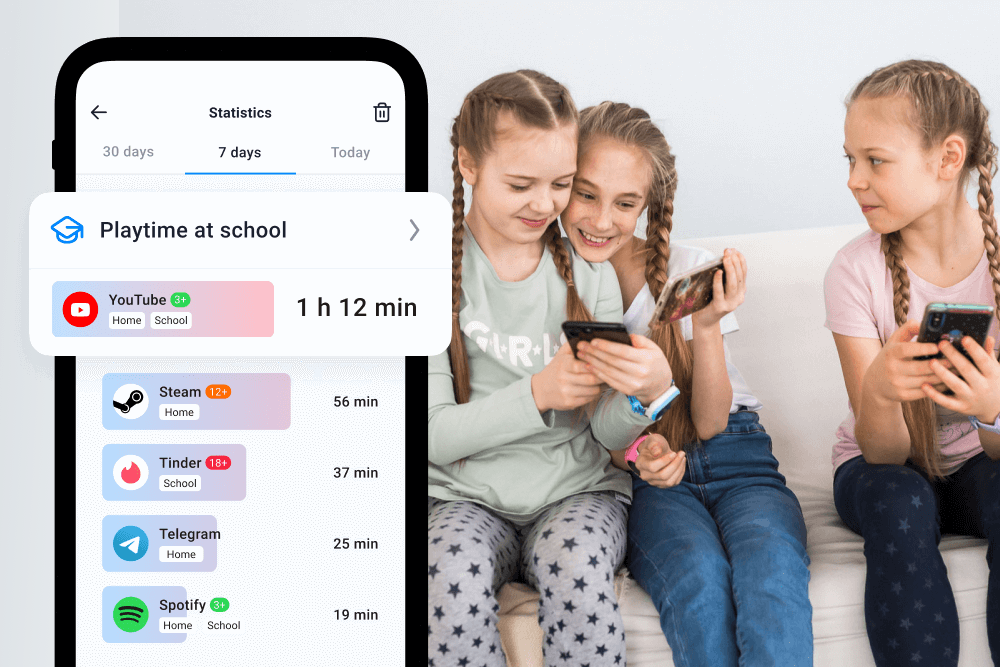Dating Apps For Kids And Teens: Best List And Parent Tips

Navigating the complexities of kids dating apps requires careful consideration and understanding of the potential risks and benefits, making it essential to explore this topic with a balanced perspective.
In May 2023 the Findmykids app carried out research to understand just what kids are doing on their phones all day. The study examined app data from over 1.9m British and American children. The statistics were collected by FMK’s own service, which allows parents to monitor their child’s mobile activity. According to the results, 17% of children’s total smartphone usage is spent on social networking sites, which includes dating apps.
Seeing the words ‘dating apps’ and kids together in the same sentence can be alarming and you are probably wondering ‘why?’ The answer is really simple: they meet new people there.
Let’s take a look at some of the most popular networking and dating apps and whether you should be worried.
Contents:
- List of Best Dating Apps For Kids
- Social Networking App Options for Younger Kids
- What Do Dating Apps Give Your Kids? Parents Explanation
- Findmykids Advice— How to Know If Your Child is Using Dating Apps?
- What To Do If You Notice That Your Child is Using Dating Apps?
- FAQs
List of Best Dating Apps For Kids
While most online dating apps are aimed at adults, there are also some dating apps for teens out there. Targeted primarily at teenage users between 13 and 17, these sites aim to facilitate online interactions between young people.
Popular teen dating sites generally have strict policies to protect users against predatory behavior, sexual content, and explicit messages. However, there are still many risks associated with these teen chat sites and social media platforms.
We’ll dig into the risks and downsides of teen online dating sites further on in the article. For now, here’s a look at the most popular dating sites and social media platforms for teen chat and romantic relationships.
MyLOL
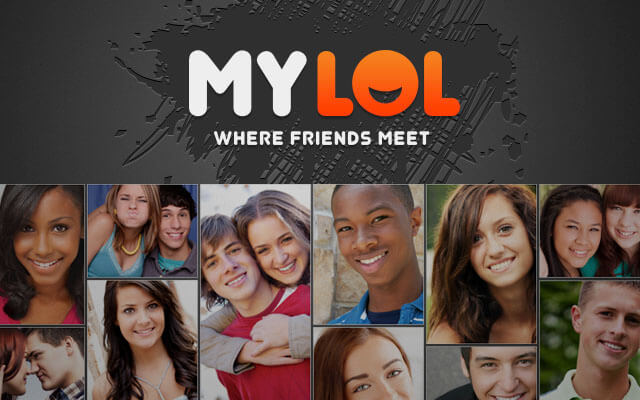
MyLOL
- Paid/Free: Both.
- Security Level: Poor. MyLOL has faced numerous controversies and safety concerns. People can enter the site anonymously and it has a reputation for attracting users who may not be interested in age-appropriate interactions. It is a potentially risky platform.
- Acceptable Age: 13–19.
Main Features: MyLOL is a social networking site and top dating app that allows users to create profiles, upload photos, and search for and connect with other users based on age, gender, and location.
Main Disadvantages: Potential for encountering inappropriate content or individuals, and it may expose underage users to online predators and cyberbullying. Its safety and appropriateness have been widely questioned, making it a source of concern for many parents.
Parents should exercise extreme caution with MyLOL. Its safety record and reputation for attracting older users raise serious concerns. We would recommend considering alternative platforms that provide a safer environment.
Skout

Credit: datingmentor.org
- Paid/Free: Both free and premium subscription options
- Security Level: Moderately secure. This social media app has faced criticism for issues related to inappropriate content and safety concerns.
- Acceptable Age: 13+.
Main Features: Skout is a teen dating app that allows users to connect with others based on location and same interests. It provides various features for social interaction and meeting new people, with account holders able to scroll through a feed of users and find new friends or connections.
Main Disadvantages: While it’s acceptable for teenagers aged 13+, there’s a potential for encountering inappropriate content or individuals. Skout’s variable safety record and the presence of users from various age groups mean that parents should closely monitor their teens’ use of the app.
Yubo
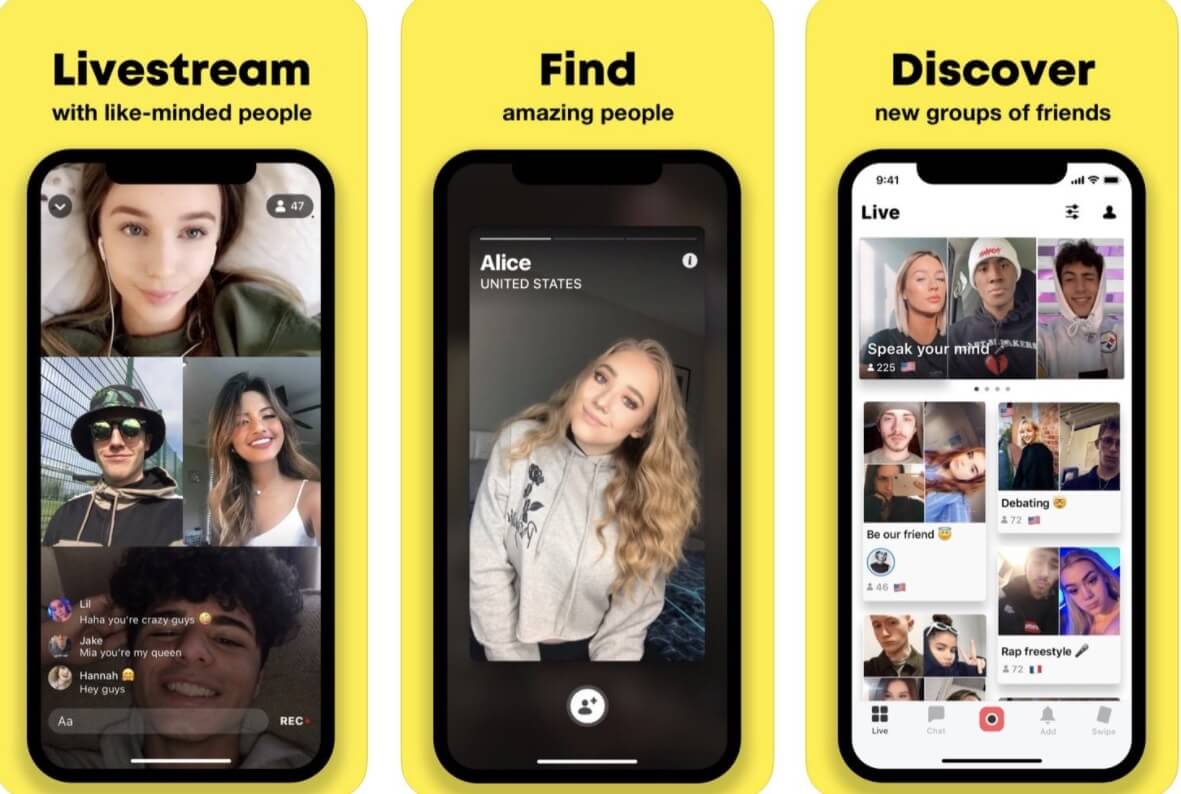
Google Play
- Paid/Free: Both. Yubo offers free basic features and a premium subscription called Yubo Power.
- Security Level: Moderately secure. Yubo, previously known as Yellow, is marketed as a social networking app for teenagers, but it has faced safety and privacy concerns, including issues related to anonymity.
- Acceptable Age: 13-25. Although there is no Yubo age limit.
Main Features: Yubo is a social networking site and dating app that allows users to create profiles, upload photos, and search for other users based on age, gender, and location. It’s intended for making friends and socializing with peers. It also supports public live streaming.
Main Disadvantages: There’s potential for encountering inappropriate content or individuals, through either messages or public live streaming. While designed for teenagers, Yubo’s features, including video profiles and anonymity, have raised safety concerns.
Spotafriend
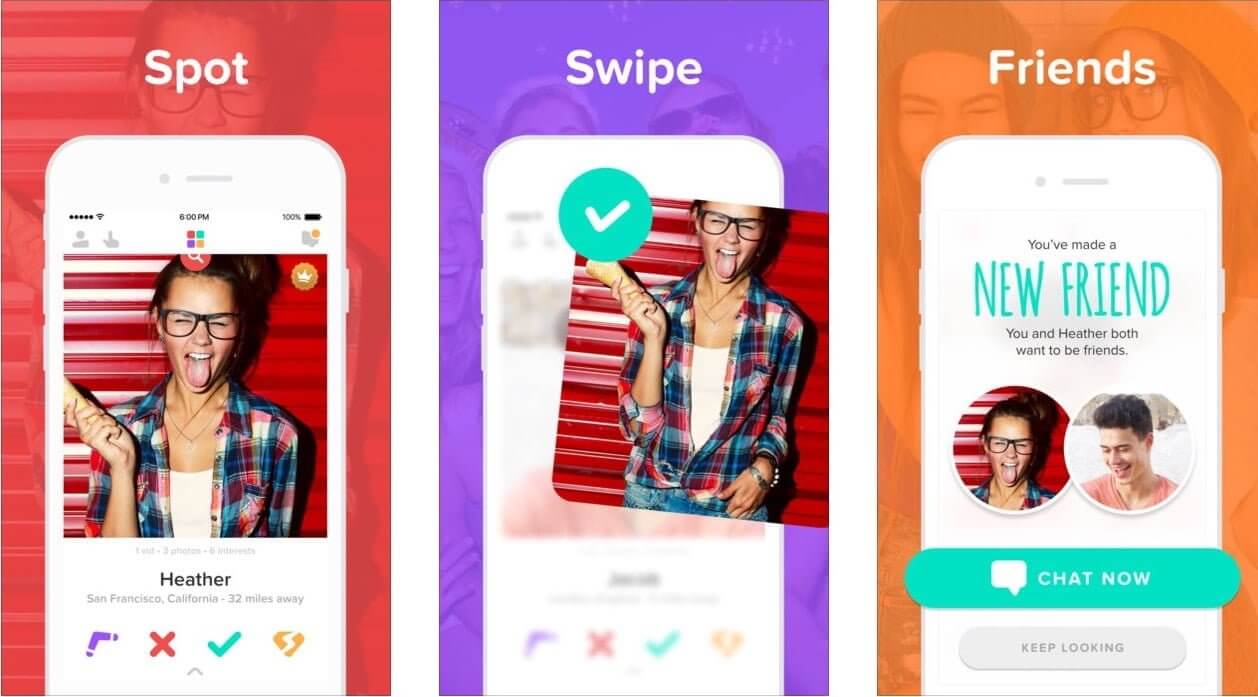
Google Play
- Paid/Free: Both.
- Security Level: Moderate. Marketed as a teen dating app and emphasizes safety, but parents should closely monitor its use due to potential safety issues.
- Acceptable Age: 13–19.
Main Features: A teen dating app that enables teenagers to make friends and potentially find romantic connections among their peers. It includes safety features to promote responsible use.
Main Disadvantages: Despite efforts to promote safety, there is still a potential for encountering inappropriate content or individuals. Parents should be vigilant about their teens’ use of the app. Like other teen-focused dating apps, parents should be aware of and involved in their teens’ use of Spotafriend.
MeetMe
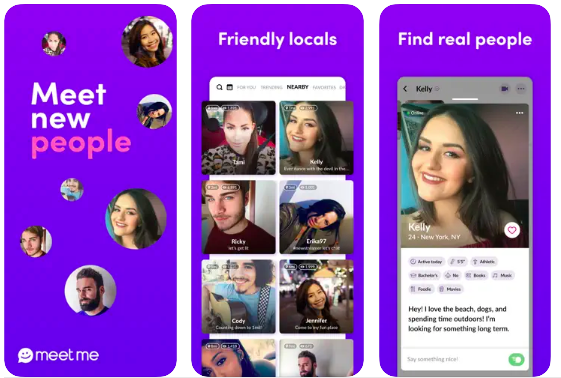
App Store
- Paid/Free: MeetMe is free, but it offers a subscription-based premium version called MeetMe+.
- Security Level: MeetMe offers privacy settings, but the safety level can vary depending on how well the settings are configured. MeetMe has had controversies in the past, and the safety level can vary depending on user behavior and privacy settings.
- Acceptable Age: Although not specifically designed for teenagers, MeetMe is popular among teenagers and young adults.
Main Features: MeetMe is a social networking platform that allows users to connect and meet new friends in their local area. It provides various features for socializing, including chat, and the ability to discover new friends nearby.
Main Disadvantages: Privacy Concerns: MeetMe allows users to connect with strangers in their local area, which can lead to privacy concerns.
Habbo Hotel

Credit: tuni.fi
- Paid/Free: Both. Habbo Hotel is a free virtual world and social networking platform with the option to purchase virtual currency for in-game items.
- Security Level: Highly secure. Habbo Hotel is designed with safety in mind and includes moderation features. Inappropriate behavior and content can be reported, making it relatively secure within the platform.
- Acceptable Age: 13–18
Main Features: Habbo Hotel is a hotel-themed virtual world where users create avatars, decorate rooms, play games, and interact with other users. It is designed for teenagers and young adults. There are various games and activities, video chat rooms, and group interaction within the virtual hotel environment.
Main Disadvantages: It’s limited to teenagers and may not be suitable for younger children. Habbo Hotel places an emphasis on safety, however there will always be an element of risk. Users should be cautious about sharing personal information, and parents should ensure that their teens understand the importance of responsible online behavior. There have been reports of inappropriate interactions and scams in the past, but it has taken steps to improve safety measures.
Related: Safe Social Media Apps for Kids.
Social Networking App Options for Younger Kids
As well as online dating sites for teens to help them possibly meet potential partners and begin an online relationship, there are also social media sites and apps aimed at even younger users.
This kind of platform may be used by those as young as six years of age. They can offer various features, such as online chat, private messages, and allowing for lines of communication between real people around the world, but tend to be less oriented around the online dating scene and online relationship goals.
Instead, they might be more playful and game-related. For example, they allow people ages 6–12 to create cute avatars, play games with other users, send direct messages, and enjoy other online interactions, without romantic elements, like discussions of life experiences or sexual orientations.
Since this type of app for teens and kids is aimed at a younger audience, they also usually come with stricter policies and security standards to block unwanted direct messages or online chat and prevent sexual predators from taking advantage of users.
Here’s a look at some of the main social and messaging app platforms for younger children.
Club Penguin
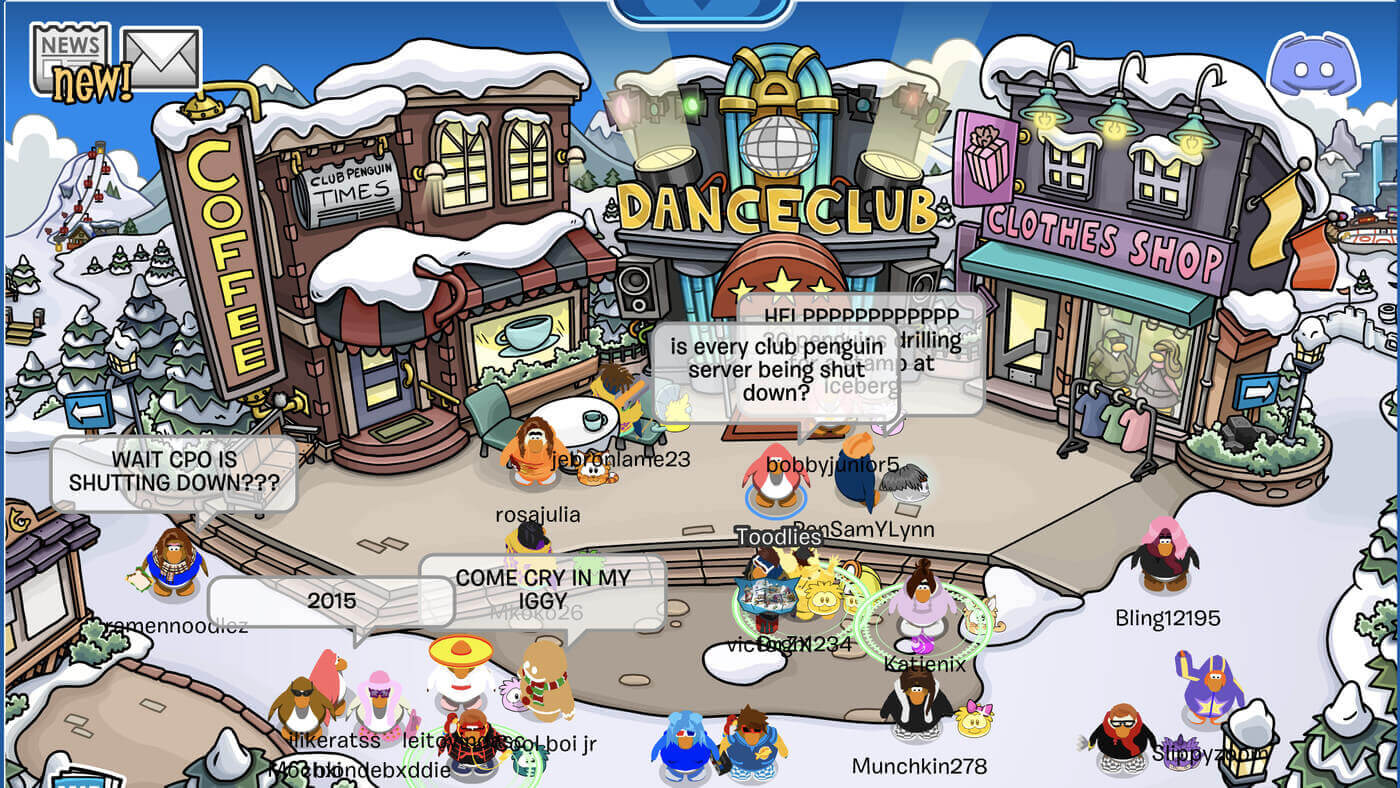
Club Penguin
- Paid/Free: Both. The free version provides access to a limited set of features, while paid memberships give you access to all features such as designing clothing.
- Security Level: Highly secure. Designed for children and is known for its emphasis on safety and moderation. The platform has numerous safety features to create a secure environment for young users.
- Acceptable Age: 6–14. No age verification or age restriction at registration.
Main Features: Club Penguin is a winter-themed virtual world. Users create penguin avatars, play games, and interact with others in a safe environment. The platform encourages creativity, teamwork, and exploration within its kid-friendly environment.
Main Disadvantages: While highly secure and suitable for younger children, it may not appeal to older children and teenagers due to its younger target audience. It is known for its safety measures, but as with any online environment, it’s not entirely risk-free. Parents should still supervise their children’s online activities, educate them about responsible online behavior.
Moshi Monsters
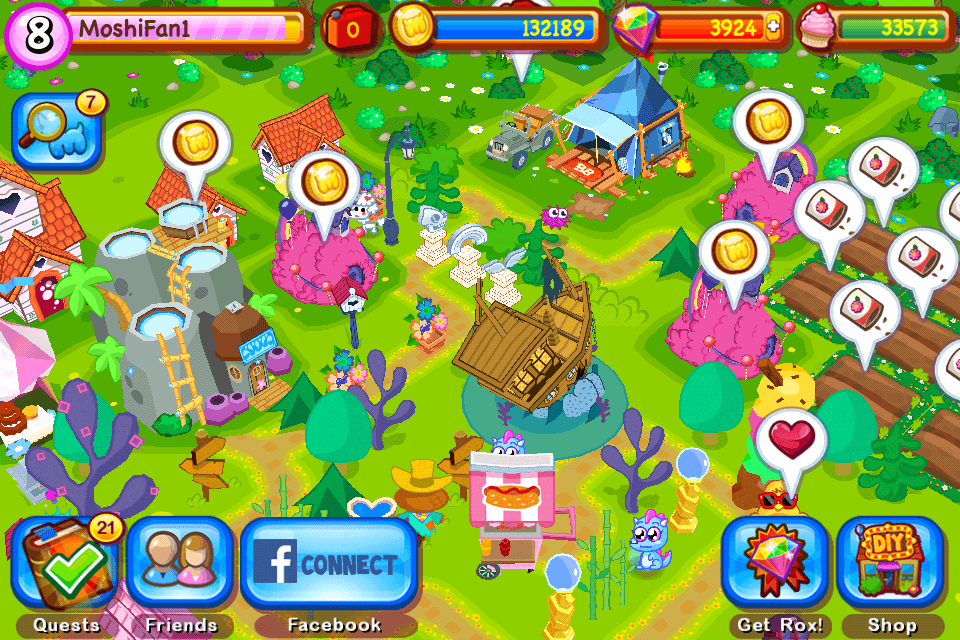
Moshi Monsters
- Paid/Free: Both. Moshi Monsters offers both free and paid subscription options. Free accounts have limited features, while paid memberships offer additional content and activities.
- Security Level: Highly secure. Specifically designed for children and intended to be a safe and kid-friendly virtual world. It uses a range of security measures to ensure a secure environment for its young users.
- Acceptable Age: 6–12.
Main Features: Moshi Monsters is a virtual pet game where users adopt and care for monster pets, play games, and interact with other users in a child-friendly, vibrant environment. The platform focuses on creativity, puzzles, and character interaction.
Main Disadvantages: Limited to a younger age group, it might not appeal to older children. Although it is designed to be a safe space for children, no online environment is entirely without risk. Parents should monitor their children’s activities and educate them about online safety, including not sharing personal information with others.
What Do Dating Apps Give Your Kids? Parents Explanation

Prostock-studio/Shutterstock.com
Now you’re armed with a list of the most popular dating apps for teens, but you might be wondering what children gain by spending time using online dating sites.
It depends on the age of the child:
- Ages 6–7. At this age, they are using the application to satisfy their curiosity. It is unlikely that the topics could capture the attention of a child of this age to the extent that they were ‘addicted’ to dating apps. There’s no need for a deep fear of this, but if there is then it can be satisfied in a simpler way—using social networks because there’s a higher chance that they will be talking to peers (especially peers interested with children of this age).
- Ages 7–10. It’s the same curiosity. It can be satisfied quickly with no consequences. It’s difficult to imagine a child of this age who is ready to forget about computer games and use social networks to talk with adults on dating apps.
- Ages 11–15. The feeling of adulthood is new at this age. Teenagers start to imagine having the same rights as adults, but actual adulthood (physical, psychological, social) is still far away. Children try to discover themselves and engage in society. The link between the needs of an adult and meetings on the internet seems clear—it’s an entrance to the adult world from the black entrance
The Pros of Using Dating Apps
So, we’ve discussed the interest towards dating apps. But what do children gain by spending time using them?
- The illusion of control in the conversation: It’s always possible to stop contact and come offline in order to avoid unpleasant emotions.
- Re-invent yourself: It’s possible to imagine yourself as someone you aren’t in real life. In conversations, many people behave more confidently than they do in real-life conversations.
- A one-person theater: It’s possible to ‘pick’ roles when talking with different people. Teenagers often copy models of behavior from different adults, trying it for themselves. This helps them to find themselves, their style of behavior, and their emotions.
- Adulthood: It’s possible to feel like an adult and to talk about ‘forbidden’ topics.
- Safety: Online conversations give the feeling of protection because the other person can’t see you. Plus, since everything is done online, there’s a benefit of “social distancing,” with users not having to worry about physical contact or interactions with the people they chat with.
- Socializing: The ability to meet peers and find a partner.
- Training: The ability to train yourself in conversations.
The Cons of Using Dating Apps

Iren_Geo/Shutterstock.com
Are they all so transparent? There are both pluses and minuses. Should you worry if your child is using these kinds of apps?
- The violation of communication skills: If online conversations (on dating apps or social networks) become their basic use of conversation, then children may struggle to communicate with people in real life. Social skills are strongly linked to our ability to understand bad emotions, discover ourselves, listen, and learn the context of a conversation. Written conversations don’t allow you to train these skills.
- Running away from problems: Teenagers don’t learn to overcome social fears, constraints, and embarrassment if they exist. Writing on the internet helps them avoid all of this.
- A doubtful society: Dating apps are not a collection of intelligent and clever people, people are all different. Unfortunately, teenagers (and adults alike) can meet fraudsters, pedophiles, psychopaths, etc. This isn’t just dating apps but a part of the internet as a whole. It’s unlikely that these conversations would be helpful for the child.
- Wasting time: There are only 24 hours in a day. Spending too much time on the internet and dating apps is always instead of other activities. How much time and at the expense of what needs to be carefully managed?
Risks to Be Aware Of
While there are many dating apps available for teenagers, parents should also be mindful of the potential risks associated with these platforms. Here are some key concerns to keep in mind:
- Age Restrictions and Age Limits: Many dating apps have age restrictions in place to prevent underage users from joining. However, these restrictions are not foolproof, and some teens may falsify their age to gain access.
- Private Chat and Chat Rooms: Teen dating apps often offer private chat features and chat rooms where users can interact. These settings can potentially lead to private conversations that parents may not be aware of.
- Social Media Integration: Some dating apps allow users to link their profiles to their social media accounts. While this can make the app seem more interactive, it also increases the potential for private exchanges and sharing of personal information.
- Video Chats: Video chats can be a feature on some teen dating apps. While this can enhance communication, it can also be misused, as video chats may involve sharing explicit content.
- Fake Profiles: There’s a risk that individuals with malicious intent can create fake profiles on dating apps. Teens might encounter individuals who pretend to be someone they are not, leading to potential dangers.
Read also: Dangerous Apps’ List for Kids and Tweens.
Findmykids Advice— How to Know If Your Child is Using Dating Apps?
It’s obviously not the best method to take their phone, dig around, and confront them about it. In order to control your child’s personal life and not be intrusive, use this lifehack!
Install the Findmykids app and keep an eye on the app statistics: what apps are installed on their smartphone and how much time they spend on them. Then you can decide if there is cause for concern.
Other signs that may indicate your child is using adult dating apps:
- Unusual Secrecy: If your child is unusually secretive about their online activities, it could be a sign that they’re engaging in something they shouldn’t.
- Excessive Screen Time: a sudden increase in screen time, particularly late at night, can be suspicious. Many dating apps are used during nighttime hours, which is a cause for concern. Use Kids360 to find this out.
- Privacy Concerns: If your child is taking extensive steps to protect their privacy online, such as using a separate phone, creating hidden accounts, or using a secondary email, they may be hiding their use of adult dating apps.
- Discrepancies in Age: Check the age and birthdate information on their social media profiles or apps. If you notice inconsistencies or false information, this could be a red flag.
- Inappropriate Conversations: Keep an eye out for any inappropriate or explicit conversations on your child’s device. Adult apps often feature explicit content that is not suitable for teenagers.
What To Do If You Notice That Your Child is Using Dating Apps?

Ground Picture/Shutterstock.com
There are commonly two reactions by adults: to become very anxious, to ban everything and gain control, or to keep calm and not pay it any attention (‘it will sort itself out’).
1. To forbid
It’s important to remember that the internet and various apps have been deeply integrated into our lives. If your child has an interest in something, then simply banning it could only increase this interest and not stop them from using it. If you lock the phone or limit the use of the computer, then your child will only use their friends’ phones, use their computer, or find other methods of doing so.
Banning and tightly controlling the use of the internet is like trying to stop a powerful jet of water with only your finger. In the end, you’ll only end up dividing adults and children.
What do teenagers see in dating apps that they can’t find in other places? What are you afraid of?
2. Excessive calmness
Another way is to give up and not pay attention. Keeping your cool whatever may happen is also a good skill. But overall not paying attention to the child’s pastimes and providing them with endless access to the internet and other apps, not controlling them at all is also another way.
How to find the golden mean?
Firstly, with a young child, you will need to discuss the internet and explain its features (for example, talk about scammers). Don’t scare them but just explain it. Secondly, if your child is using apps try to understand why they are using them. Try to direct them towards ones that are age-appropriate as they will have more safety controls built in.
To ensure your teenager’s safety while using these apps, it’s crucial to have open and honest conversations about the risks. Discuss the importance of never sharing personal information with strangers online and encourage your teen to come to you if they encounter any suspicious or uncomfortable behavior. By staying engaged and informed, parents can help their teenagers make responsible and safe choices while using teen dating apps!
FAQs

Ground Picture/Shutterstock.com
Is there any dating app for kids?
There are no legitimate dating sites for 12-15-year-olds, as most dating platforms require users to be at least 18 years old. Some social apps allow teenagers to interact in a safe and monitored environment, but they are not specifically designed for dating. Parents should stay aware of online interactions to ensure safety.
What are the dangers of online dating for teenagers?
Online dating dangers for teenagers include exposure to inappropriate content, cyberbullying via private messaging, and encounters with individuals with ill intentions, highlighting the need for parental guidance and monitoring through parental control apps.
What is the youngest age for dating apps?
Most dating apps, including Tinder, Bumble, and Hinge, set the minimum age at 18. In the past, some platforms had teen-specific sections, but these have largely been discontinued due to safety concerns. There are no official dating sites for 12-15-year-olds, and it’s crucial for parents to monitor online activity to ensure their child’s safety.
What is the dating app for 14-year-olds?
For a 14-year-old seeking age-appropriate dating apps, options like Yubo (formerly Yellow), or Teenber provide safer alternatives. These apps cater to teenagers and emphasize safety, but parental supervision remains crucial.
Can 12-year-olds use dating apps?
Most dating and social apps require users to be 13 or older, per the Children’s Online Privacy Protection Act (COPPA). Nonetheless, parents should closely oversee 12-year-olds’ app usage for safety.
What are the dos and don’ts of online dating?
Do:
- Foster open communication with your teenager about the app and online safety.
- Educate your teen on online privacy, risk recognition, and responsible behavior.
- Supervise online activity with trust and guidance.
- Instill the importance of respectful and responsible online conduct.
Don’t:
- Discourage sharing personal information with strangers.
- Emphasize the need for your knowledge and safe, public meeting places.
- Be vigilant about potential red flags, such as behavioral changes or online harassment.
- Ensure your teen uses reputable, age-appropriate apps, and consider using parental controls.
Are dating apps for teens a good way to build self-confidence and social skills?
While dating apps can foster peer interaction and enhance self-confidence and social skills, they must be used with caution. Proper guidance is vital to navigating potential risks that may affect self-confidence adversely if not managed correctly.
Are there dating sites for 13-year-olds?
Yes, there are certain dating apps and sites that market themselves towards teens. MyLOL is one of the most prominent examples, aimed at users aged between 13 and 19.
What is the kid version of Tinder?
There isn’t an official version of Tinder for teens. However, there are apps that are similar to Tinder and aimed at teenage users, such as Yubo and Skout.
Is Tinder ok for 13-year-olds?
No, Tinder is not appropriate for 13-year-olds. The app’s minimum age requirement is 18, and it is designed for adults seeking romantic connections. Allowing a young teen on Tinder exposes them to potential risks, including interactions with much older individuals and inappropriate content. If a teen is interested in social connections, safer, age-appropriate alternatives like Spot or Yubo (with parental guidance) may be better options.
Is Tinder for 14 year olds?
No, Tinder temporarily allowed teenage users to sign up and only connect with other users in the teenage age range (13–17). However, that has since changed, and Tinder is now only for those aged 18 and up.
Can you use Hinge at 17?
No, Hinge requires users to be at least 18 years old. Like most apps for teens and adults, dating platforms enforce age restrictions to protect younger users. Teens looking for social interaction should explore age-appropriate communities rather than adult dating apps.
Are dating apps for minors legal?
There aren’t any official laws against teenage users from signing up to certain online dating sites or apps. However, many of the big dating apps—like Tinder—have strict age policies and only accept users aged 18+.
Can kids start dating?
There’s no universal rule for when kids can start dating—it depends on maturity, family values, and individual circumstances. Many experts suggest that the early teen years (13-15) are when kids begin to explore friendships and crushes, but actual dating often happens later. Open conversations and guidance from parents can help teens navigate relationships safely.
The picture on the front page: Ground Picture/Shutterstock.com
Проверьте электронный ящик














